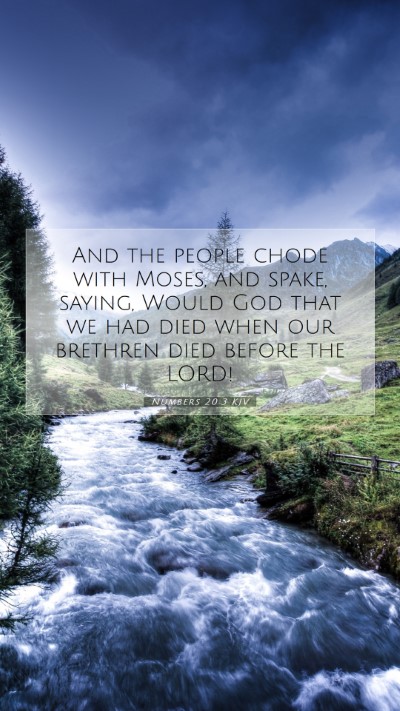Bible Verse Interpretation: Numbers 20:3
Verse Text: And the people chode with Moses, and spake, saying, Would God that we had died when our brethren died before the Lord!
Understanding the Context
The verse occurs during the Israelites' journey through the wilderness, reflecting their continuous struggles, frustrations, and lack of faith. It marks a pivotal moment in the narrative where the people express discontent and a longing for the past, particularly in light of their recent hardships.
Commentary Insights
-
Matthew Henry:
Henry emphasizes the people's rebellious spirit, indicating that their complaints arose not just from thirst but from a deeper dissatisfaction with their situation in the wilderness. This verse illustrates the recurring theme of Israel's rebellion against God and their leaders when faced with trials.
-
Albert Barnes:
Barnes highlights the irony in the people's wish to die as their brethren had, suggesting that their lamentation reveals a lack of trust in God’s provision. He notes how the wilderness experience tests the faith of the Israelites, and their grumbling signifies a failure to acknowledge God's past deliverances.
-
Adam Clarke:
Clarke provides insight into the emotional state of the Israelites. He points to their despair as a spiritual crisis; they long for something that symbolizes stability and hope. Clarke notes that such expressions of discontent often lead to greater spiritual repercussions, emphasizing the need for faith during trials.
Key Themes in Numbers 20:3
-
Rebellion Against Leadership:
The verse signifies the tension between Moses and the Israelites, a reminder of the challenges that leaders face when guiding a struggling community.
-
Lamentation and Regret:
The expression of wishing to have died reflects a deep-seated despair that can emerge during difficult times, showcasing the human tendency to idealize the past.
-
Lack of Faith:
This lamentation indicates a profound lack of faith in God's ability to sustain and lead them, a recurring issue throughout their journey.
Application of the Verse in Daily Life
Numbers 20:3 serves as a reminder for modern readers about the significance of maintaining faith amidst adversity. It invites believers to recognize their challenges while trusting in God's guidance, rather than succumbing to frustration and complaint. Applying this principle can encourage individuals in faith-based settings or bible study groups to confront their struggles not with discontent, but with a heart of gratitude and trust.
Related Bible Cross References
- Exodus 16:2-3 - Complaints about lack of food in the wilderness.
- 1 Corinthians 10:10 - Paul references the Israelites’ complaints and their consequences.
- Psalm 78:19 - Reflects on Israel's questioning of God's ability to provide.
Final Thoughts
In summary, Numbers 20:3 encapsulates a critical moment for the Israelite community and serves as a profound lesson in faith, leadership, and community dynamics. By understanding this verse through Bible study insights and biblical exegesis, believers can enrich their bible study resources, apply these lessons to their lives, and foster a deeper connection with the teachings found in the Scriptures.


